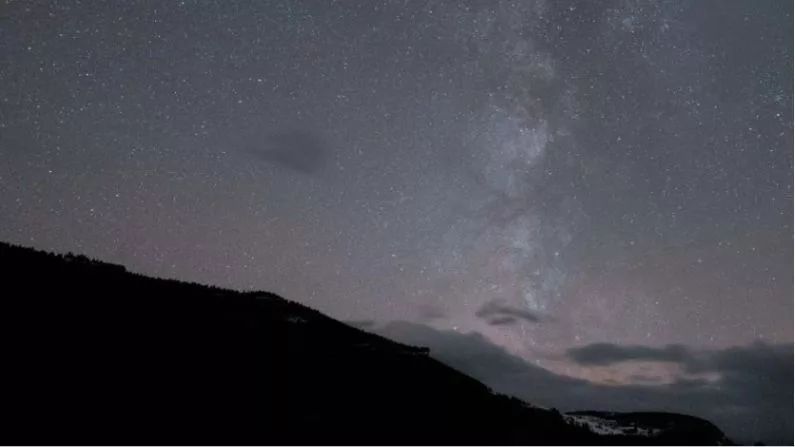This story comes through a content-sharing partnership with Wyoming Public Media.
A dazzling night sky filled with bright stars has long been a source of wonder and inspiration – and Sinks Canyon State Park wants to do its part to keep Wyoming’s dark skies dark.
After a three-year application process, the park outside of Lander became the state’s first International Dark Sky Park through DarkSky International, an organization that raises awareness about light pollution. The designation recognizes the work the park has done to protect this often-overlooked resource.
To qualify for the designation, Sinks Canyon State Park did an inventory of all the existing lights on their 600 acres to assess their compliance with DarkSky standards. They then shielded their lights to make sure no unnecessary brightness impacted the night sky and created a long-term plan for light management.
Additionally, the park installed timers and motion sensors on their lights and completed a written application that ended up being almost sixty pages. They also held night sky education programming about moth insect identification and constellations for the public to receive the stamp of approval from DarkSky International.
Jessica Moore is the superintendent at Sinks Canyon State Park. She said the park certainly doesn’t have the darkest sky in all of Wyoming, but that the new distinction is an excellent way to raise awareness around light pollution.
“What this can do is really start to spread the word about why we need to keep the skies dark and the importance for the wildlife and for the people who live here and recreate here,” Moore said.
Currently, more than 200 parks, communities and protected areas around the world have been certified through the International Dark Sky Places program. According to the organization’s website, locations in 22 countries have received the designation, and more than 160,000 square kilometers of land and night sky have been protected through the work of those sites.
The park’s superintendent said dark skies benefit humans and wildlife alike and their absence can have a big impact on a group of animals that might surprise some – amphibians.
“They don’t make their breeding calls until it’s dark, and if it’s not dark enough, they won’t think it’s nighttime and they don’t make those calls. Then that breeding cycle doesn’t happen and we start to see loss of species,” Moore said.
The International Dark Sky Park designation isn’t a “one and done” – the park has to submit a report every year that will be reviewed to ensure they still qualify for the designation. To maintain their standing, Moore said the park is required to host at least four educational outreach events every year and regularly take measurements of the area’s light quality during the new moons.
The biggest threat to the park’s designation is the town of Lander itself. But, Moore said the park staff are already collaborating with city administration officials, Lander’s mayor and assistant mayor, and town facilities personnel to help reduce their light emissions.
“As long as we’re here and keeping the sky dark, we’ll be working with them and helping them to find ways that they can help keep the sky dark. They’re very excited about it as well,” she said.
For Moore, the importance of maintaining Wyoming’s dark skies is deeply personal. During a vacation a few years ago, Moore and her two teenage daughters were staying out in Clark, a small town about 30 miles north of Cody. She said their reaction to the night sky that evening is a big part of why she’s doing this work at Sinks Canyon State Park.
“My one daughter had tears in her eyes. She said, ‘This is the most amazing thing I’ve ever seen in my life.’ They had never seen stars like that before and that’s what I want people to experience,” Moore said.
To the Sinks Canyon superintendent, every step towards keeping dark skies dark is “important and appreciated.” Moore said everyone can help make a difference when it comes to light pollution, whether that’s by simply turning off a porch light at night or getting involved in community-wide efforts.
In Teton County, the Jackson Hole Airport is working toward becoming the first certified dark-sky airport, according to Wyoming Stargazing’s Samuel Singer. He said Grand Teton National Park, Teton County and Jackson are also working toward certifications. The municipalities have passed ordinances restricting outdoor lighting, which produce light pollution that obscures stars and throw off human’s circadian rhythms.
KHOL Reporter Hanna Merzbach added to this report.






